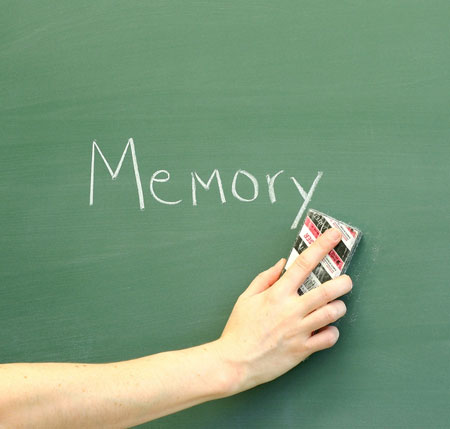
|
Roadside bombs, childhood abuse, car accidents—they form memories that can shape (and damage) us for a lifetime. Now, a handful of studies have shown that we’re on the verge of erasing and even rewriting memories. The hope is that this research will lead to medical treatments, especially for addiction and post-traumatic stress disorder (PTSD). Researchers have known for decades that memories are unreliable. They’re particularly adjustable when actively recalled because at that point they’re pulled out of a stable molecular state. Last spring, scientists published a study performed at the University of Washington in which adult volunteers completed a survey about their eating and drinking habits before age 16. A week later, they were given personalized analyses of their answers that stated—falsely—that they had gotten sick from rum or vodka as a teen. One in five not only didn’t notice the lie, but also recalled false memories about it and rated that beverage as less desirable than they had before. Studies like these point to possible treatments for mental health problems. Both PTSD and addiction disorders hinge on memories that can trigger problematic behaviors, such as crippling fear caused by loud noises or cravings brought about by the sight of drug paraphernalia. Several studies have found chemical compounds that can be used to subdue or even delete memories in mice (and maybe someday in people). In June, a report led by an Emory University researcher showed that SR-8993, a drug that acts on the brain’s opioid receptors, can prevent a fear memory from forming. Researchers strapped mice to a wooden board for two hours—a stressful experience that later gave them a heightened sense of fear similar to PTSD. But mice given SR-8993 before or after the stressful incident were less likely to end up this way. Another study identified a drug, Latrunculin A, that can erase memories days later. The researchers trained rodents to consume methamphetamine in an environment with distinctive visual, tactile, and scent cues such as black walls, gridded floors, and the scent of vanilla or peppermint. Rodents that were injected with Latrunculin A two days later didn’t seek out meth when returned to that environment, but others did. To make more targeted treatments, researchers will ultimately need to understand how the brain’s neurons encode each memory. Last year, Susumu Tonegawa at the Massachusetts Institute of Technology reported that individual memories in mice leave telltale molecular signatures in the brain’s hippocampus region. In July, his group caused mice to falsely associate an old memory with a new context—essentially creating a false memory. The idea of scientists manipulating memory does, naturally, sound a bit creepy. But it also points to some possible good: treatment for millions of people tormented by real memories. And that’s something worth remembering. |
路邊炸彈、童年受虐、慘烈車(chē)禍……這些可怕的場(chǎng)景會(huì)成為記憶,然后帶來(lái)一生的陰影。據(jù)美國(guó)媒體報(bào)道,現(xiàn)有研究顯示清除甚至改寫(xiě)記憶即將成為可能,這將為醫(yī)治上癮和創(chuàng)傷后應(yīng)激障礙(PTSD)等心理病癥提供一種全新的治療方法。
諸如此類(lèi)的研究為治療心理健康疾病提供了一個(gè)全新的視角。包括上癮和創(chuàng)傷后應(yīng)激障礙在內(nèi),類(lèi)似的心理疾病都與能夠激發(fā)問(wèn)題行為的記憶緊密相關(guān),例如噪音會(huì)使患者感到恐懼、看到吸毒用具則會(huì)勾起毒癮。 還有一些研究發(fā)現(xiàn),化合物可以被用來(lái)抑制甚至消除老鼠的負(fù)面記憶。今年6月,美國(guó)埃默里大學(xué)的研究人員發(fā)布了一篇研究報(bào)告,報(bào)告稱(chēng)一種名為“SR-8993”的藥物可作用于大腦中的阿片樣物質(zhì)受體,從而阻止形成恐懼記憶。實(shí)驗(yàn)過(guò)程中,研究人員把老鼠捆綁在木板上長(zhǎng)達(dá)兩個(gè)小時(shí),對(duì)于受試?yán)鲜蠖裕@是一種可怕的經(jīng)歷,它們會(huì)產(chǎn)生類(lèi)似創(chuàng)傷后應(yīng)激障礙的心理恐懼。而服用了“SR-8993”藥物的老鼠,產(chǎn)生恐懼心理的幾率比沒(méi)有服用藥物的老鼠要低。 另一種名為“拉春庫(kù)林A”的藥物,則能夠在事后清除記憶。在這個(gè)實(shí)驗(yàn)中,科學(xué)家對(duì)受試?yán)鲜筮M(jìn)行訓(xùn)練,令其一旦處于特定的幽閉環(huán)境就會(huì)食用冰毒。兩天后,受訓(xùn)成功的老鼠被注射了“拉春庫(kù)林A”藥物,當(dāng)它們被再次放入幽閉環(huán)境時(shí),卻沒(méi)有食用病毒。而那些沒(méi)有注射的老鼠則如常食用。
(譯者 肉肉融 編輯 丹妮) |
